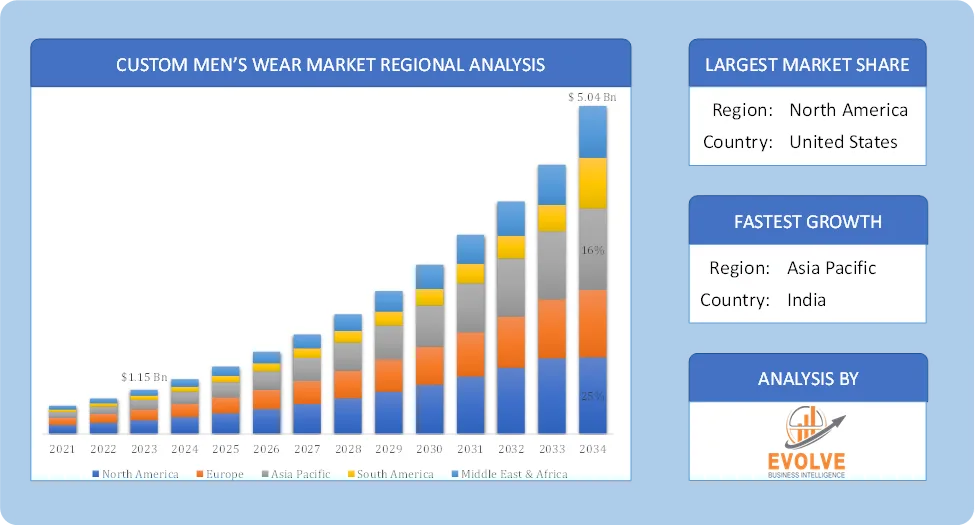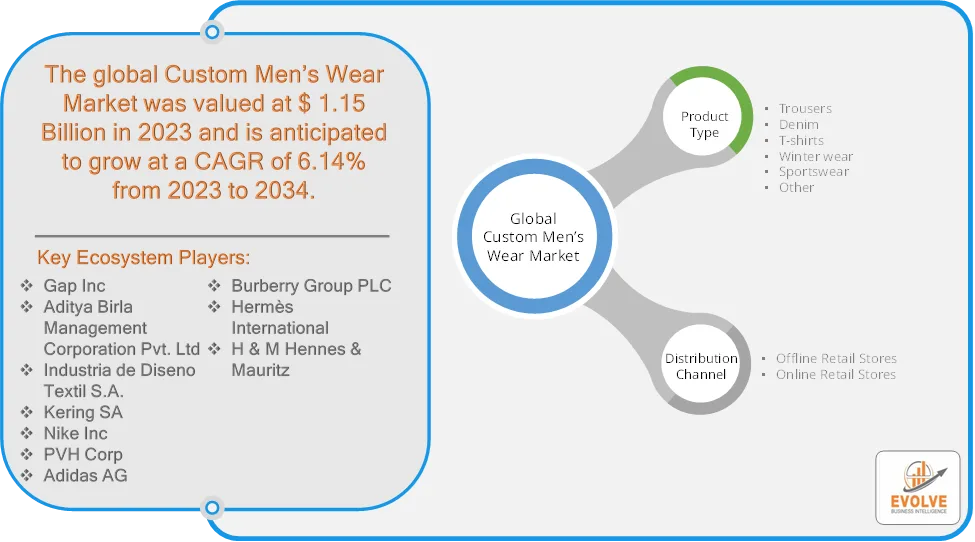Custom Men’s Wear Market Analysis and Global Forecast 2023-2033
$ 1,390.00 – $ 5,520.00Price range: $ 1,390.00 through $ 5,520.00
Custom Men’s Wear Market Research Report: Information By Product Type (Trousers, Denim, T-shirts, Winter wear, Sportswear, Other), By Distribution Channel (Offline Retail Stores, Online Retail Stores), and by Region — Forecast till 2033
Custom Mens Wear Market Overview
The Custom Mens Wear Market size accounted for USD 1.15 Billion in 2023 and is estimated to account for 1.87 Billion in 2024. The Market is expected to reach USD 5.04 Billion by 2034 growing at a compound annual growth rate (CAGR) of 6.14% from 2024 to 2034. The global custom mens wear market is experiencing notable growth, driven by increasing consumer demand for personalized and well-fitted clothing. The custom men’s wear market is gaining momentum, with indigenous brands and designers offering innovative and tailored designs. The rise of fashion-conscious men and the influence of celebrities and social media have propelled the demand for occasion wear, including suits, tuxedos, and bandgalas. Brands like Studio H-2 and SS Homme are capitalizing on this trend by providing bespoke and ready-to-wear options that cater to the evolving preferences of Indian consumers.
The custom men’s wear market is poised for continued growth, driven by a combination of technological integration, evolving consumer preferences, and a desire for personalized fashion experiences.
Global Custom Mens Wear Market Synopsis
 Custom Mens Wear Market Dynamics
Custom Mens Wear Market Dynamics
The major factors that have impacted the growth of Custom Men’s Wear Market are as follows:
Drivers:
Ø Technological Advancements and E-commerce Growth
The integration of technology, such as virtual consultations and online fittings, has made custom men’s wear more accessible, expanding its reach to a broader audience. This technological integration, coupled with the growth of e-commerce platforms, provides personalized shopping experiences that cater to the modern consumer’s needs. A renewed appreciation for traditional tailoring and high-quality craftsmanship has bolstered the custom men’s wear market. Brands like Dolce & Gabbana have embraced men’s couture, showcasing exceptional and unique pieces that highlight local Italian craftsmanship and traditions. Their presentations often incorporate regional elements, emphasizing a deep engagement with local artisans and a passion for beauty and craftsmanship over commercial gains.
Restraint:
Ø Memory High Manufacturing Costs and Price Sensitivity
Customization often leads to increased production expenses due to specialized materials, intricate designs, and additional labor requirements. These elevated costs can result in higher retail prices, potentially limiting the customer base to those willing to pay a premium. Custom-made garments are often priced higher than mass-produced alternatives, which may be unaffordable for a broad segment of consumers. This price disparity can limit market penetration.
Opportunity:
⮚ Expansion into Men’s Shapewear
The growing interest among men in body-transforming products, influenced by social media and a focus on appearance, has led to the emergence of men’s shapewear. Brands are introducing sculpting girdles, compression shirts, and supportive boxers, tapping into a market previously dominated by women’s products. There is a burgeoning demand for niche and artisanal menswear brands that emphasize craftsmanship, authenticity, and personal narratives. This trend reflects a shift towards specificity and individuality in menswear, moving away from global megabrands and offering opportunities for small-scale operations focused on quality and unique design.
Custom Men’s Wear Market Segment Overview

By Product Type
Based on Product Type, the market is segmented based on Trousers, Denim, T-shirts, Winter wear, Sportswear, Other. The Trousers segment in the Custom Men’s Wear market is poised for substantial growth throughout the forecast period, driven by an increasing focus on individualized style preferences, a growing awareness of tailored fit aesthetics, and the rising demand for bespoke trousers as a key element in men’s personalized wardrobes. This trend reflects a broader shift towards customized and well-fitted clothing choices, emphasizing the trousers segment as a significant driver of market expansion.
By Distribution Channel
Based on Distribution Channel, the market segment has been divided into the Offline Retail stores, Online Retail Stores. The Offline Retail Stores segment in the Custom Men’s Wear market is poised for substantial growth during the forecast period, attributed to the enduring appeal of in-person consultations, personalized fittings, and the tactile experience of selecting fabrics, fostering a strong consumer preference for traditional brick-and-mortar retail environments for custom clothing purchases. This trend underscores the significance of physical stores in providing a personalized and immersive shopping experience for discerning consumers in the realm of bespoke men’s wear.
Global Custom Men’s Wear Market Regional Analysis
Based on region, the global Custom Men’s Wear Market has been divided into North America, Europe, Asia-Pacific, the Middle East & Africa, and Latin America. North America is projected to dominate the use of the Custom Men’s Wear Market followed by the Asia-Pacific and Europe regions.

North America Global Custom Men’s Wear Market
North America holds a dominant position in the Custom Men’s Wear Market. This region is a significant market, driven by a strong consumer culture that values personalization and individuality. Technological advancements, particularly in online customization and 3D scanning, are prevalent and there’s a high demand for tailored suits and customized casual wear.
Asia-Pacific Global Custom Men’s Wear Market
The Asia-Pacific region has indeed emerged as the fastest-growing market for the Custom Men’s Wear Market industry. This region is experiencing rapid growth, fueled by rising disposable incomes and a growing middle class, especially in countries like China and India. There’s a growing demand for both traditional and contemporary custom wear and the region’s role as a major manufacturing hub facilitates the growth of custom apparel production.
Competitive Landscape
The global Custom Men’s Wear Market is highly competitive, with numerous players offering a wide range of software solutions. The competitive landscape is characterized by the presence of established companies, as well as emerging startups and niche players. To increase their market position and attract a wide consumer base, the businesses are employing various strategies, such as product launches, and strategic alliances.
Prominent Players:
- Gap Inc
- Aditya Birla Management Corporation Pvt. Ltd
- Industria de Diseno Textil S.A.
- Kering SA
- Nike Inc
- PVH Corp
- Adidas AG
- Burberry Group PLC
- Hermès International
- H & M Hennes & Mauritz.
Scope of the Report
Global Custom Men’s Wear Market, by Product Type
- Trousers
- Denim
- T-shirts
- Winter wear
- Sportswear
- Other
Global Custom Men’s Wear Market, by Distribution Channel
- Offline Retail Stores
- Online Retail Stores
Global Custom Men’s Wear Market, by Region
- North America
- US
- Canada
- Mexico
- Europe
- UK
- Germany
- France
- Italy
- Spain
- Benelux
- Nordic
- Rest of Europe
- Asia Pacific
- China
- Japan
- South Korea
- Indonesia
- Austalia
- Malaysia
- India
- Rest of Asia Pacific
- South America
- Brazil
- Argentina
- Rest of SouthAmerica
- Middle East &Africa
- Saudi Arabia
- UAE
- Egypt
- SouthAfrica
- Rest of Middle East & Africa
| Parameters | Indicators |
|---|---|
| Market Size | 2033: USD 5.04 Billion |
| CAGR (2023-2033) | 6.14% |
| Base year | 2022 |
| Forecast Period | 2023-2033 |
| Historical Data | 2021 (2017 to 2020 On Demand) |
| Report Coverage | Revenue Forecast, Competitive Landscape, Growth Factors, and Trends |
| Key Segmentations | Product Type, Distribution Channel |
| Geographies Covered | North America, Europe, Asia-Pacific, South America, Middle East, Africa |
| Key Vendors | Gap Inc, Aditya Birla Management Corporation Pvt. Ltd, Industria de Diseno Textil S.A., Kering SA, Nike Inc, PVH Corp, Adidas AG, Burberry Group PLC, Hermès International and H & M Hennes & Mauritz. |
| Key Market Opportunities | · Expansion into Men’s Shapewear · Rise of Niche and Artisanal Brands |
| Key Market Drivers | · Technological Advancements and E-commerce Growth · Cultural Appreciation for Craftsmanship |
REPORT CONTENT BRIEF:
- High-level analysis of the current and future Custom Men’s Wear Market trends and opportunities
- Detailed analysis of current market drivers, restraining factors, and opportunities in the future
- Custom Men’s Wear Market historical market size for the year 2021, and forecast from 2023 to 2033
- Custom Men’s Wear Market share analysis at each product level
- Competitor analysis with detailed insight into its product segment, Government & Defense strength, and strategies adopted.
- Identifies key strategies adopted including product launches and developments, mergers and acquisitions, joint ventures, collaborations, and partnerships as well as funding taken and investment done, among others.
- To identify and understand the various factors involved in the global Custom Men’s Wear Market affected by the pandemic
- To provide a detailed insight into the major companies operating in the market. The profiling will include the Government & Defense health of the company’s past 2-3 years with segmental and regional revenue breakup, product offering, recent developments, SWOT analysis, and key strategies.
Frequently Asked Questions (FAQ)
What is the study period of this market?
The study period of the global Custom Men’s Wear Market is 2021- 2033
What is the growth rate of the global Custom Men’s Wear Market?
The global Custom Men’s Wear Market is growing at a CAGR of 4.41% over the next 10 years
Which region has the highest growth rate in the market of Custom Men’s Wear Market?
Asia Pacific is expected to register the highest CAGR during 2023-2033
Which region has the largest share of the global Custom Men’s Wear Market?
North America holds the largest share in 2022
Who are the key players in the global Custom Men’s Wear Market?
Gap Inc, Aditya Birla Management Corporation Pvt. Ltd, Industria de Diseño Textil S.A., Kering SA, Nike Inc, PVH Corp, Adidas AG, Burberry Group PLC, Hermès International and H & M Hennes & Mauritz. are the major companies operating in the market.
Do you offer Post Sale Support?
Yes, we offer 16 hours of analyst support to solve the queries
Do you sell particular sections of a report?
Yes, we provide regional as well as country-level reports. Other than this we also provide a sectional report. Please get in contact with our sales representatives.
Press Release

Global Pharmaceutical Manufacturing Market to Reach $1.38 Trillion by 2035 with 7.35% CAGR, New Research Shows

The Global Mammography Market Is Estimated To Record a CAGR of Around 10.29% During The Forecast Period

Glue Stick Market to Reach USD 2.35 Billion by 2034

Podiatry Service Market to Reach USD 11.88 Billion by 2034

Microfluidics Technology Market to Reach USD 32.58 Billion by 2034

Ferric Chloride Market to Reach USD 10.65 Billion by 2034

Family Practice EMR Software Market to Reach USD 21.52 Billion by 2034

Electric Hairbrush Market to Reach USD 15.95 Billion by 2034

Daily Bamboo Products Market to Reach USD 143.52 Billion by 2034

Cross-border E-commerce Logistics Market to Reach USD 112.65 Billion by 2034
Table of Content
Chapter 1. Executive Summary Chapter 2. Scope Of The Study 2.1. Market Definition 2.2. Scope Of The Study 2.2.1. Objectives of Report 2.2.2. Limitations 2.3. Market Structure Chapter 3. Evolve BI Methodology Chapter 4. Market Insights and Trends 4.1. Supply/ Value Chain Analysis 4.1.1. Raw End Users Providers 4.1.2. Manufacturing Process 4.1.3. Distributors/Retailers 4.1.4. End-Use Industry 4.2. Porter’s Five Forces Analysis 4.2.1. Threat Of New Entrants 4.2.2. Bargaining Power Of Buyers 4.2.3. Bargaining Power Of Suppliers 4.2.4. Threat Of Substitutes 4.2.5. Industry Rivalry 4.3. Impact Of COVID-19 on the Custom Men’s Wear Market 4.3.1. Impact on Market Size 4.3.2. End-Use Industry Trend, Preferences, and Budget Impact 4.3.3. Regulatory Framework/Government Policies 4.3.4. Key Players' Strategy to Tackle Negative Impact 4.3.5. Opportunity Window 4.4. Technology Overview 12.28. Macro factor 4.6. Micro Factor 4.7. Demand Supply Gap Analysis of the Custom Men’s Wear Market 4.8. Import Analysis of the Custom Men’s Wear Market 4.9. Export Analysis of the Custom Men’s Wear Market Chapter 5. Market Dynamics 5.1. Introduction 5.2. DROC Analysis 5.2.1. Drivers 5.2.2. Restraints 5.2.3. Opportunities 5.2.4. Challenges 5.3. Patent Analysis 5.4. Industry Roadmap 5.5. Parent/Peer Market Analysis Chapter 6. Global Custom Men’s Wear Market, By Product Type 6.1. Introduction 6.2. Trousers 6.3. Denim 6.4. T-shirts 6.5. Winter wear 6.6 Sportswear 6.7 Other Chapter 7. Global Custom Men’s Wear Market, By Distribution Channel 7.1. Introduction 7.2. Offline Retail Stores 7.3. Online Retail Stores Chapter 8. Global Custom Men’s Wear Market, By Region 8.1. Introduction 8.2. North America 8.2.1. Introduction 8.2.2. Driving Factors, Opportunity Analyzed, and Key Trends 8.2.3. Market Size and Forecast, By Country, 2024-2034 8.2.4. Market Size and Forecast, By Product Type, 2024-2034 8.2.5. Market Size and Forecast, By End User, 2024-2034 8.2.6. US 8.2.6.1. Introduction 8.2.6.2. Driving Factors, Opportunity Analyzed, and Key Trends 8.2.6.3. Market Size and Forecast, By Product Type, 2024-2034 8.2.6.4. Market Size and Forecast, By End User, 2024-2034 8.2.7. Canada 8.2.7.1. Introduction 8.2.7.2. Driving Factors, Opportunity Analyzed, and Key Trends 8.2.7.4. Market Size and Forecast, By Product Type, 2024-2034 8.2.7.5. Market Size and Forecast, By End User, 2024-2034 8.3. Europe 8.3.1. Introduction 8.3.2. Driving Factors, Opportunity Analyzed, and Key Trends 8.3.3. Market Size and Forecast, By Country, 2024-2034 8.3.4. Market Size and Forecast, By Product Type, 2024-2034 8.3.5. Market Size and Forecast, By End User, 2024-2034 8.3.6. Germany 8.3.6.1. Introduction 8.3.6.2. Driving Factors, Opportunity Analyzed, and Key Trends 8.3.6.3. Market Size and Forecast, By Product Type, 2024-2034 8.3.6.4. Market Size and Forecast, By End User, 2024-2034 8.3.7. France 8.3.7.1. Introduction 8.3.7.2. Driving Factors, Opportunity Analyzed, and Key Trends 8.3.7.3. Market Size and Forecast, By Product Type, 2024-2034 8.3.7.4. Market Size and Forecast, By End User, 2024-2034 8.3.8. UK 8.3.8.1. Introduction 8.3.8.2. Driving Factors, Opportunity Analyzed, and Key Trends 8.3.8.3. Market Size and Forecast, By Product Type, 2024-2034 8.3.8.4. Market Size and Forecast, By End User, 2024-2034 8.3.9. Italy 8.3.9.1. Introduction 8.3.9.2. Driving Factors, Opportunity Analyzed, and Key Trends 8.3.9.3. Market Size and Forecast, By Product Type, 2024-2034 8.3.9.4. Market Size and Forecast, By End User, 2024-2034 8.3.11. Rest Of Europe 8.3.11.1. Introduction 8.3.11.2. Driving Factors, Opportunity Analyzed, and Key Trends 8.3.11.3. Market Size and Forecast, By Product Type, 2024-2034 8.3.11.4. Market Size and Forecast, By End User, 2024-2034 8.4. Asia-Pacific 8.4.1. Introduction 8.4.2. Driving Factors, Opportunity Analyzed, and Key Trends 8.4.3. Market Size and Forecast, By Country, 2024-2034 8.4.4. Market Size and Forecast, By Product Type, 2024-2034 8.12.28. Market Size and Forecast, By End User, 2024-2034 8.4.6. China 8.4.6.1. Introduction 8.4.6.2. Driving Factors, Opportunity Analyzed, and Key Trends 8.4.6.3. Market Size and Forecast, By Product Type, 2024-2034 8.4.6.4. Market Size and Forecast, By End User, 2024-2034 8.4.7. India 8.4.7.1. Introduction 8.4.7.2. Driving Factors, Opportunity Analyzed, and Key Trends 8.4.7.3. Market Size and Forecast, By Product Type, 2024-2034 8.4.7.4. Market Size and Forecast, By End User, 2024-2034 8.4.8. Japan 8.4.8.1. Introduction 8.4.8.2. Driving Factors, Opportunity Analyzed, and Key Trends 8.4.8.3. Market Size and Forecast, By Product Type, 2024-2034 8.4.8.4. Market Size and Forecast, By End User, 2024-2034 8.4.9. South Korea 8.4.9.1. Introduction 8.4.9.2. Driving Factors, Opportunity Analyzed, and Key Trends 8.4.9.3. Market Size and Forecast, By Product Type, 2024-2034 8.4.9.4. Market Size and Forecast, By End User, 2024-2034 8.4.10. Rest Of Asia-Pacific 8.4.10.1. Introduction 8.4.10.2. Driving Factors, Opportunity Analyzed, and Key Trends 8.4.10.3. Market Size and Forecast, By Product Type, 2024-2034 8.4.10.4. Market Size and Forecast, By End User, 2024-2034 8.5. Rest Of The World (RoW) 8.5.1. Introduction 8.5.2. Driving Factors, Opportunity Analyzed, and Key Trends 8.5.3. Market Size and Forecast, By Product Type, 2024-2034 8.5.4. Market Size and Forecast, By End User, 2024-2034 Chapter 9. Company Landscape 9.1. Introduction 9.2. Vendor Share Analysis 9.3. Key Development Analysis 9.4. Competitor Dashboard Chapter 10. Company Profiles 10.1. Gap Inc 10.1.1. Business Overview 10.1.2. Government & Defense Analysis 10.1.2.1. Government & Defense – Existing/Funding 10.1.3. Product Portfolio 10.1.4. Recent Development and Strategies Adopted 10.1.5. SWOT Analysis 10.2. Aditya Birla Management Corporation Pvt. Ltd 10.2.1. Business Overview 10.2.2. Government & Defense Analysis 10.2.2.1. Government & Defense – Existing/Funding 10.2.3. Product Portfolio 10.2.4. Recent Development and Strategies Adopted 10.2.5. SWOT Analysis 10.3. Industria de Diseno Textil S.A. 10.3.1. Business Overview 10.3.2. Government & Defense Analysis 10.3.2.1. Government & Defense – Existing/Funding 10.3.3. Product Portfolio 10.3.4. Recent Development and Strategies Adopted 10.3.5. SWOT Analysis 10.4. Kering SA 10.4.1. Business Overview 10.4.2. Government & Defense Analysis 10.4.2.1. Government & Defense – Existing/Funding 10.4.3. Product Portfolio 10.4.4. Recent Development and Strategies Adopted 10.12.28. SWOT Analysis 10.5. Nike Inc 10.5.1. Business Overview 10.5.2. Government & Defense Analysis 10.5.2.1. Government & Defense – Existing/Funding 10.5.3. Product Portfolio 10.5.4. Recent Development and Strategies Adopted 10.5.5. SWOT Analysis 10.6. PVH Corp 10.6.1. Business Overview 10.6.2. Government & Defense Analysis 10.6.2.1. Government & Defense – Existing/Funding 10.6.3. Product Portfolio 10.6.4. Recent Development and Strategies Adopted 10.6.5. SWOT Analysis 10.7. Adidas AG 10.7.1. Business Overview 10.7.2. Government & Defense Analysis 10.7.2.1. Government & Defense – Existing/Funding 10.7.3. Product Portfolio 10.7.4. Recent Development and Strategies Adopted 10.7.5. SWOT Analysis 10.8 Burberry Group PLC 10.8.1. Business Overview 10.8.2. Government & Defense Analysis 10.8.2.1. Government & Defense – Existing/Funding 10.8.3. Product Portfolio 10.8.4. Recent Development and Strategies Adopted 10.8.5. SWOT Analysis 10.9 Hermes International 10.9.1. Business Overview 10.9.2. Government & Defense Analysis 10.9.2.1. Government & Defense – Existing/Funding 10.9.3. Product Portfolio 10.9.4. Recent Development and Strategies Adopted 10.9.5. SWOT Analysis 10.10. H & M Hennes & Mauritz 10.10.1. Business Overview 10.10.2. Government & Defense Analysis 10.9.2.1. Government & Defense – Existing/Funding 10.10.3. Product Portfolio 10.10.4. Recent Development and Strategies Adopted 10.10.5. SWOT Analysis
Connect to Analyst
Research Methodology









